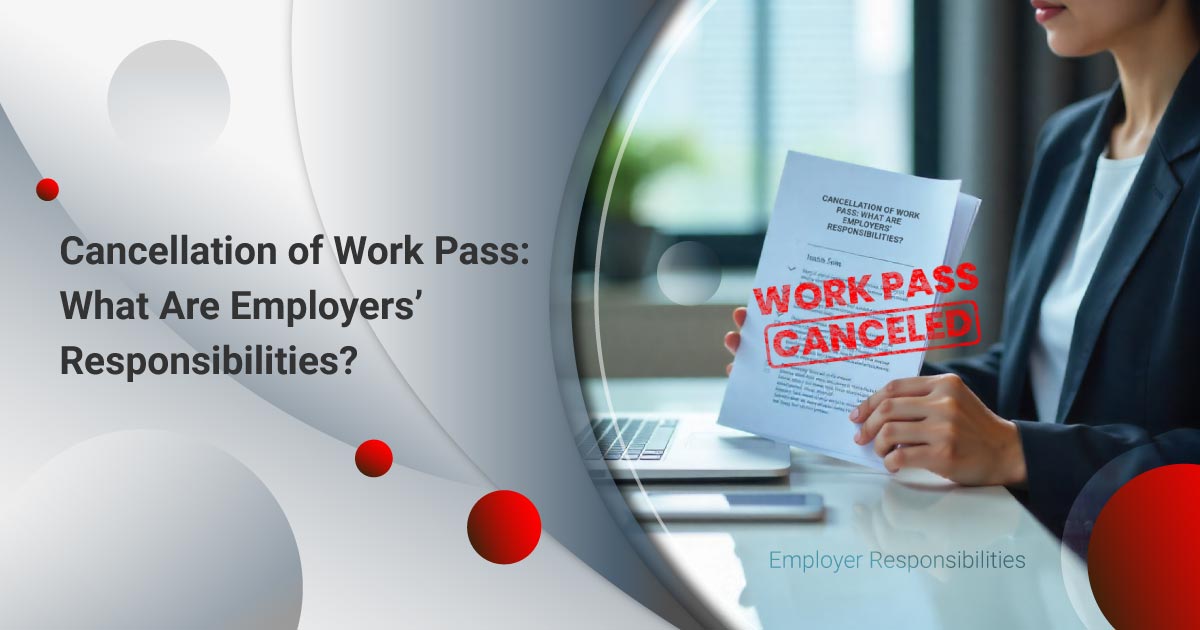Work pass cancellation in Singapore is a legally mandated process that can expose employers to significant financial penalties and operational disruption if handled incorrectly. When foreign employees leave your organisation, you have exactly one week to complete a range of obligations spanning multiple government agencies, each with their own deadlines and requirements.

Employers who mismanage this process face substantial fines, potential imprisonment, and in severe cases, complete debarment from hiring foreign workers – a near-death sentence for businesses dependent on international talent. Ministry of Manpower’s (MOM) enforcement framework treats work pass cancellation violations as serious breaches that warrant swift, decisive action.
This article breaks down every employer responsibility during work pass cancellation, from pre-departure financial settlements to post-cancellation monitoring duties. You will discover the specific timelines, documentation requirements, and hidden liabilities that determine whether your next employee departure proceeds smoothly or triggers costly regulatory intervention.
The Legal Mandate to Cancel
Singapore’s work pass cancellation obligation is absolute and non-negotiable. Employers must cancel any work pass within 1 week after an employee’s last day of employment, regardless of whether the departure results from resignation, dismissal, contract completion, or permanent exit from Singapore.
This timeline is rigid by design. MOM treats the cancellation deadline as a fundamental compliance requirement rather than a flexible guideline. The 1-week window begins ticking from the employee’s final working day, creating pressure for employers to have all supporting processes, including salary settlements, tax clearance, and repatriation arrangements already in motion.
Employers cannot refuse to cancel a work pass as leverage in employment disputes. Employees possess the legal right to resign with proper notice or payment in lieu, and MOM will intervene directly if employers attempt to weaponise immigration status during conflicts.
2 specific exceptions exist: cancellation is not required when employees attain Singapore Permanent Resident status, or when passes have already expired. However, expired passes create hidden liabilities, where employers must request Special Passes or STVPs for workers remaining in Singapore to prevent illegal overstaying.
Related Read: Singapore ONE Pass Visa: Check Eligibility and Benefits
Financial Settlement Before Cancellation
Singapore’s work pass system historically directly links financial compliance with immigration obligations. For example, we have seen MOM block cancellation requests when employers owe departing employees outstanding payments. This creates a straightforward equation: no settlement means no cancellation, forcing employers to resolve payment obligations before immigration compliance becomes possible.
Complete Payment Requirements
As an extension of outstanding base pay requirements, overtime earnings, unused leave balances, performance bonuses, transport allowances, and every other contractual obligation require clearing before MOM processes your cancellation request. The ministry uses this leverage deliberately to protect employee rights by making final payments a gateway requirement.
We recommend that internal teams start financial calculations as soon as resignation letters arrive. Delayed settlements will invariably push cancellation deadlines, extend levy payments and create compliance pressure. Your finance department becomes the bottleneck that determines whether the one-week window remains achievable. If this is the case, we recommend talking to a trusted immigration partner such as InCorp for tailored support and advice.
Tax Clearance Through Form IR21
IRAS demands advance notice for departing foreign workers. File Form IR21 at least 1 month before their final working day, which is the longest lead time in the entire process. Missing this deadline will likely make tax clearance impossible within your cancellation window.
The withholding requirements are comprehensive. Freeze all employee payments from the moment you become aware of their departure. Salary, bonuses, leave payments – everything remains frozen until IRAS calculates tax liability and issues clearance instructions.
Pass-Specific Cancellation Procedures
Through our work with hundreds of Singapore employers, we have observed that different work pass categories create distinctly different departure experiences. The portal you use, processing timeframes, and post-cancellation grace periods vary significantly, and mistakes here can derail carefully planned departure schedules.
Employment Pass and S Pass Cancellations
EP and S Pass cancellations through the EP eService on myMOM Portal usually process instantly, giving employers immediate confirmation. We recommend scheduling cancellations carefully if you need the pass to remain valid for specific departure dates.
The post-cancellation breathing room works in everyone’s favour. EP holders typically receive STVPs valid for up to 90 days, while S Pass holders get 30 days. We have seen this timeframe prove invaluable for employees securing new positions or handling family arrangements.
Repatriation costs follow conditional rules that we help clients structure properly. Employers pay unless the pass holder agrees in writing to cover their own journey home. We have guided companies through drafting employment contract clauses that satisfy this written consent requirement while remaining fair to employees.
Work Permit Cancellations
We have found Work Permit cancellations via WP Online take up to 3 working days, which can be a timeline that surprises employers accustomed to instant EP processing. Factor this delay into your departure scheduling.
The post-cancellation reality creates urgency. Work Permit holders receive just 14-day Special Passes, leaving minimal flexibility for extended arrangements. We recommend confirming flight bookings before submitting cancellation requests.
Employers face absolute repatriation liability for Work Permit holders, and there is no negotiation possible. For non-Malaysian workers, the $5,000 security bond adds complexity, with discharge requiring successful departure and full compliance verification.
Related Read: 3 Ways for Professionals to Get Work Visa in Singapore
Repatriation Responsibilities

Singapore places return journey costs directly on employers, creating financial obligations that extend far beyond simple ticket purchases. Through countless employee departures, we have learned that repatriation involves comprehensive departure management with real consequences for getting the details wrong.
The liability structure follows worker protection principles that we see consistently applied. Work Permit holders receive absolute coverage, where employers fund their return regardless of why employment ended. Even if the employee’s position is terminated, these responsibilities still exist. EP and S Pass holders operate under conditional arrangements where written consent allows self-funded departures.
Flight bookings are just the starting point. MOM requires employers to schedule departures within 2 weeks of cancellation, arrange reasonable luggage allowances, and coordinate connecting transport to reach the nearest international entry point in their home country. We have handled cases where employers overlooked transit visa requirements, leading to boarding denials and costly rebooking exercises.
Written departure agreements prevent last-minute complications. Document layover arrangements, connecting flight responsibilities, and destination country entry requirements. Workers denied boarding because of missing health declarations or expired travel documents become your extended liability while grace periods tick away. Your responsibility continues until physical departure from Singapore occurs. Airport drop-offs do not end employer obligations – workers who remain in Singapore beyond permit validity create ongoing compliance issues that trace back to inadequate departure verification.
Post-Cancellation Compliance Duties
Once a work pass is cancelled, former employees enter a restricted status where work becomes prohibited, creating monitoring responsibilities that continue until their confirmed departure. Grace period violations carry serious consequences. Whether holding 14-day Special Passes or 90-day STVPs, holders of cancelled passes cannot accept employment offers, freelance assignments, or any income-generating activities. Employers who fail to communicate these restrictions clearly risk their former employees breaching immigration conditions.
Administrative cleanup requires attention to detail. Foreign worker levy payments cease 1 day before the official cancellation date. Physical work pass cards need destruction by cutting in half to prevent fraudulent misuse after cancellation.
Security bond management affects Work Permit employers with non-Malaysian workers. The S$5,000 bond discharges only after successful cancellation, confirmed departure, and compliance verification. Bond forfeiture occurs when employers fail salary payments, skip repatriation obligations, or lose track of workers entirely.
Workers who overstay their grace periods create immediate problems. Criminal charges apply to individuals, while employers face scrutiny for inadequate departure management. We recommend employers track departure dates actively rather than assuming compliance occurs automatically.
Related Read: Your Simple Singapore Working Visa Guide
Special Scenarios in the Cancellation Process
In our experience, not every departure follows standard cancellation pathways. Worker transfers and disappearances, for example, create unique compliance challenges that require different approaches from the typical cancel-and-repatriate process.
Worker transfers offer cost-saving alternatives but split responsibilities between employers. New employers initiate fresh work permit applications while current employers retain complete liability (wages, housing, daily maintenance) until replacement passes activate. The handover creates vulnerability periods where accountability becomes blurred.
To increase labour market flexibility and retain skilled workers, process sector employers face additional complexity through “transfer without consent” periods from 40-21 days before permit expiry. Competitors can poach experienced workers during this window, forcing current employers to act decisively on renewal decisions or risk losing valuable personnel.
Missing workers demand immediate action. Report disappearances to police and cancel permits within one week. Following proper procedures reduces security bond forfeitures from full S$5,000 amounts to S$2,500 partial losses – meaningful savings that reward compliant reporting behaviour.
Agency Coordination and Jurisdiction
Confusion over which agency handles post-cancellation extensions wastes precious time during tight grace periods. MOM issues STVPs and Special Passes following work pass cancellations, making MOM the only authority that can extend these permits. ICA manages tourist visit passes but cannot extend employment-related permits. Approaching the wrong agency delays responses while grace periods expire, potentially creating overstaying violations.
Where to Next With InCorp

Work pass cancellation demands precise coordination across multiple agencies, tight deadlines, and significant financial liabilities. A single misstep, such as missed IR21 deadlines, incomplete salary settlements, or inadequate repatriation arrangements, creates cascading compliance failures that expose employers to operational disruption or even penalties.
InCorp’s immigration specialists manage the complete cancellation process, from initial departure notifications through confirmed legal departures. Our integrated approach coordinates HR, finance, and immigration functions while maintaining compliance across MOM, IRAS, and related agency requirements. We handle the complex documentation, monitor critical deadlines, and manage the detailed logistics that determine success or failure.
Contact InCorp today to discuss how our work pass cancellation services can protect your business from costly compliance mistakes while ensuring smooth, professional employee departures.
FAQs about Cancellation of Work Pass
Can a work permit be cancelled?
- Yes, work permits must be cancelled by employers within one week after an employee's last day of employment. This is a legal obligation, not optional, and applies regardless of whether departure results from resignation, dismissal, or contract completion.
What to do before cancelling a work permit?
- Employers must settle all outstanding payments including final salary, overtime, and benefits. Non-citizen employees require tax clearance through IRAS Form IR21 filed at least one month in advance. Arrange repatriation logistics and confirm all financial obligations are resolved.
What happens after you cancel a work permit?
- Cancelled Work Permit holders receive 14-day Special Passes for departure preparation. They cannot work during this period and must leave Singapore before expiry. Employers must ensure physical departure occurs and destroy the old work permit.


